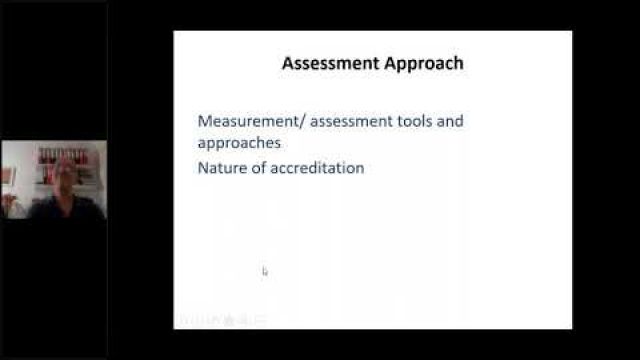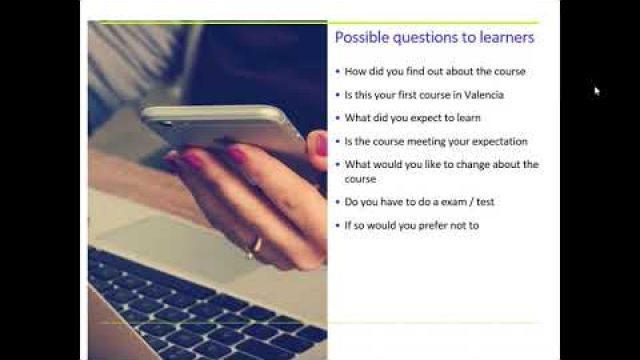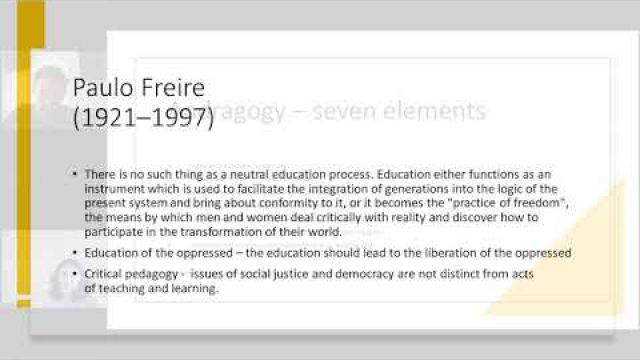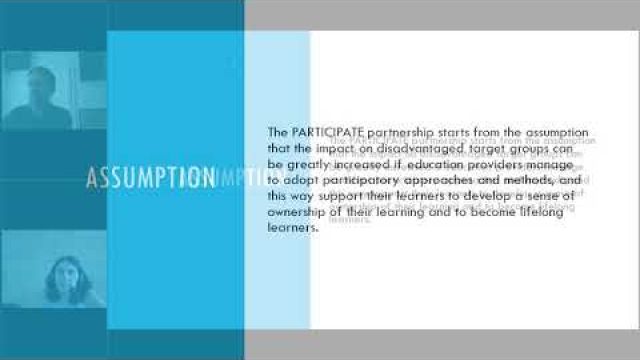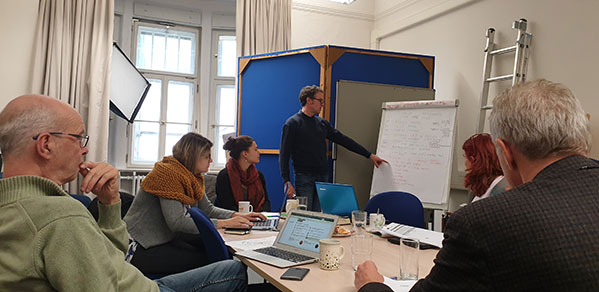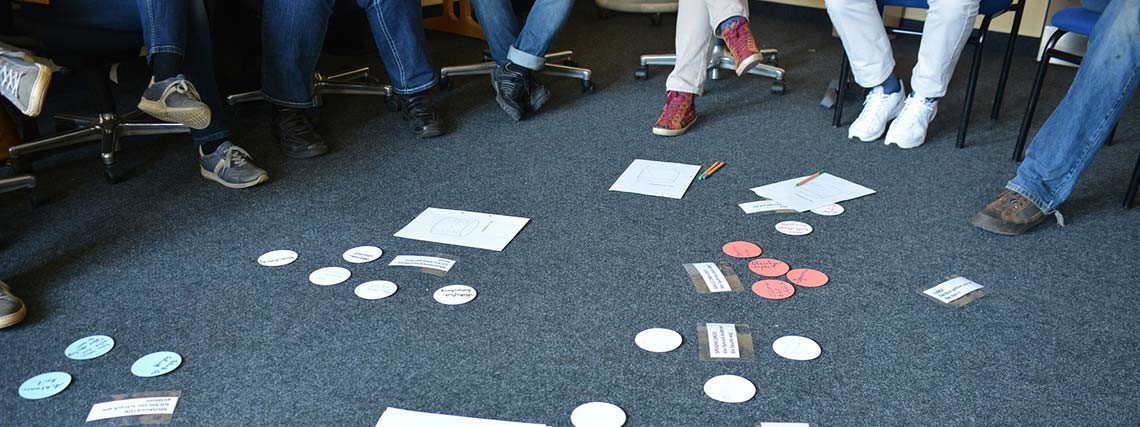
PARTICIPATE - Participatory Methods in Adult Education
Building a model for participatory design of learning outcomes
Pas d'annonces actuellement.
Attention ESD enthusiasts, teachers and trainers:
Are you already familiar with the ESD-Competency-Framework for adult education?
It was developed in the "5P Competences" project and can now be used for free by all interested persons, e.g. in their function as trainers.
You can find more information on the ESD competency framework and exciting contributions on the topic of ESD/adult education in the "5P - Sustainability Competences in Adult Education" group:
www.discuss-community.eu/de/community/groups/viewg…
Come in and join the group!

PARTICIPATE - Participatory Methods in Adult Education
Europe is becoming a learning society and citizens are required to constantly update their competences, not only with regard to the world of work but in an encompassing approach to participate in contemporary societies. Moreover, European societies face a rapid differentiation of educational pathways, opportunities and biographies. This increase in complexity from learners requires great effort into initiative taking, creativity, problem solving, risk assessment and decision taking, all of which requires learners to become stakeholders of their own learning process. It however has been demonstrated, that learner groups with a disadvantaged background or those remote from learning have great difficulties to take ownership of their learning, without being empowered.However, although a great deal of rhetoric about learner empowerment, adult education practice too often remains caught in traditional instruction methods, fixed curricula and pre-defined learning outcomes. It's in...

PARTICIPATE - Participatory Methods in Adult Education
Europe is becoming a learning society and citizens are required to constantly update their competences, not only with regard to the world of work but in an encompassing approach to participate in contemporary societies. Moreover, European societies face a rapid differentiation of educational pathways, opportunities and biographies. This increase in complexity from learners requires great effort into initiative taking, creativity, problem solving, risk assessment and decision taking, all of which requires learners to become stakeholders of their own learning process. It however has been demonstrated, that learner groups with a disadvantaged background or those remote from learning have great difficulties to take ownership of their learning, without being empowered.However, although a great deal of rhetoric about learner empowerment, adult education practice too often remains caught in traditional instruction methods, fixed curricula and pre-defined learning outcomes. It's in...
Randolph - mise à jour du groupe, PARTICIPATE - Participatory Methods in Adult Education
Emotions in learning
The way adults learn is different from children and there is a need to take that in consideration, to improve the process of teaching and learning in adult education. Malcom Knowles describe adult education as the art and science helping adults to learn. Adults learn better from experience, they favour a pragmatic approach and must be able to apply to solve specific problem, they are interested in learn things immediate relevant, they need to be involved in the planning and evaluation of their instruction. Jonava Adult and Youth Education Centre, located in a small town in Lithuania, is implementing the project “Improving Adult Education” under Erasmus+ programme. The aim of the project is to strengthen staff competencies which could help to develop learners' social emotional skills, improve feedback and modernise the activities of the Centre. The project takes in consideration a lot the emotional intelligence, the importance between emotions and emotions of others (source:...
PARTICIPATE - Participatory Methods in Adult Education
www.participate-project.eu/
The project homepage is online now. Please note that this version is for desktop computers / notebooks only. We are currently producing the mobile version, which will be available in a few days. Hope you like it.
Moreover, over the next weeks we will expand the website with information about ongoing project activities, and results achieved so far. So, stay tuned.
Best
Randolph




ideal-participation.eu/site/
Two key principles of such methods are: learning about things that matter and learning by exposure to different perspectives. By focusing on what matters to individuals, instead of teaching a predefined and fixed model of culture, learners are encouraged to interact with others to explore their identity and the context of their own cultural group, which already holds different perspectives. Consequently, through encounters with locals and exposure to habits and language of the receiving country, other perspectives will challenge the learning process even more.
-
Europe is becoming a learning society and citizens are required to constantly update their competences, not only with regard to the world of work but in an encompassing approach to participate in contemporary societies. Moreover, European societies face a rapid differentiation of educational pathways, opportunities and biographies. This increase in complexity from learners requires great effort into initiative taking, creativity, problem solving, risk assessment and decision taking, all of which requires learners to become stakeholders of their own learning process. It however has been demonstrated, that learner groups with a disadvantaged background or those remote from learning have great difficulties to take ownership of their learning, without being empowered.
However, although a great deal of rhetoric about learner empowerment, adult education practice too often remains caught in traditional instruction methods, fixed curricula and pre-defined learning outcomes. It's in particular low achievers who suffer from this situation, because in the formal education system they often have made the experience that major parameters of their learning is out of their control, and thus never had the chance to develop a sense of ownership for their own learning.
The PARTICIPATE partnership starts from the assumption that the impact on disadvantaged target groups can be greatly increased if education providers manage to adopt participatory approaches and methods, and this way support their learners to develop a sense of ownership of their learning and to become lifelong learners. The overall objective of the PARTICIPATE project is to promote participatory methods in adult education and, more specifically it will build a model for participatory design of learning outcomes.
The PARTICIPATE project will identify and examine good practice in the field and, from them derive a generic model for the design of participatory evaluation and assessment of learning outcomes, whereby the adult learner is included in this process of setting their own outcomes and indicators. Instead of being initially presented with a final set of specific learning outcomes within an already agreed assessment framework, the learners are offered the opportunity to participate in determining how their course will be measured and evaluated. Complementary PARTICIPATE will promote participatory design of learning assessment, and support educators and practitioners on its implementation.
-
Catégorie
Quality in Edcuation & Training -
Créé
mardi 8 septembre 2020 -
Administrateurs du groupe
Randolph



